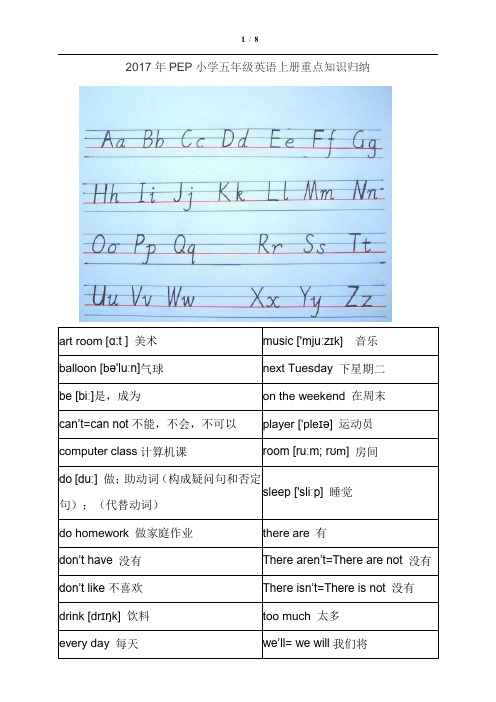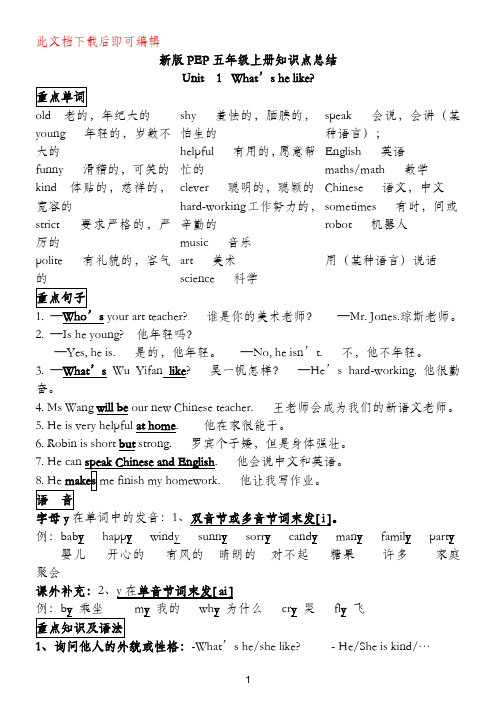2017年五年级上册英语复习重点新标准英语
新标准英语五年级上册期末复习笔记

五年级上册各模块重点句型归纳MODULE 11.Did you come back yesterday?Did+主语+动词原形+其他?Yes, 主语+did./ No, 主语+didn’t.2.No, we came back last Sunday.主语+动词过去式+其他.MODULE 21.How many apples did your mum say?How many +可数名词复数+其他?2.How much cheese did she say?How much +不可数名词+其他?3.What did you buy?We bought some apples.I/ We bought + 某物.MODULE 31.What did you do at the weekend?What did +主语+ do +其他?We visited lots of places.主语+ 动词过去式+其他.2.Where did you go?Where did +主语+ go?We went to the British Museum.主语+ went (to )+地点.3.How did you go to these places?How did+主语+ go (to )+地点?On foot./ By bike./ By bus./ By car./ By plane.MODULE 41.What’s the matter?What’s the matter with+ 某人/某物?2.I’m sorry.That’s OK.3.He lost his bag.主语+ lost+某物.MODULE 51.How many pupils are there in your class, Lingling?How many+可数名词复数+ are there+其他?There are forty.There are+基数词. MODULE 61.Can you run fast?Can+主语+动词原形(+其他)?No, I can’t.Yes, 主语+can./ No, 主语+can’t.2. You can play football well, Lingling.主语+ can+动词(短语)原形+ well.3.You’re very good at basketball.主语+ be动词+ good at+其他. MODULE 71.He can’t see.主语+ can’t+动词原形(+其他).2.This dog helps him.主语+ help/ helps+其他.MODULE 81.What time is it now?What time is it (now)?It’s half past eight.It’s +时间(+ o’clock).2.What time does your school start?What time+助动词+人/物+动词(短语)原形(+其他)?My school starts at nine o’clock in the morning.人/物+动词(短语)+at +时间. MODULE 91.Are you feeling sad?Are you feeling+形容词?Yes, I am./ No, I’m not.2.Now I feel tired.I feel+形容词.3.How does she feel?How do/ does+主语+ feel?主语+ feel/ feels +形容词.MODULE 101. Where did you find Lingling?Where did you find+某人/某物?I found Lingling in the toilet.I found+ 某人/某物+地点.2.Don’t walk on the grass.Don’t+ 动词原形+其他.新标准英语五年级上册各模块重点短语归纳MODULE 11.go to london 去伦敦2.above the ground 在地面上方3.be back from…从……回来e back 回来st Sunday 上星期日6.live in 居住7.look at 看8.go home 回家9.wait for 等待10.walk to school 步行去上学11.go to the park with…与……(一起)去公园12.run to …跑向……13.by bus 乘公共汽车14.by bike 骑自行车15.by plane 乘飞机16.watch TV 看电视17.How are you? 你好吗?e with us. 跟我们一起来吧。
五年级英语上册知识点归纳整理

五年级英语上册知识点归纳整理
单词
- 总结五年级上册所有单元的重要单词及其词义,包括拼写和发音。
- 提供单词的词性和用法示例,以帮助学生理解和记忆单词。
语法
- 总结五年级上册涉及的基本语法知识,如时态、人称等。
- 提供简洁明了的语法规则,并给出相关的练题,帮助学生巩固所学的语法知识。
短语和句子
- 汇总五年级上册教材中出现的常用短语和句子,如问候、表达意见等。
- 提供例句,以帮助学生了解短语和句子的应用场景。
阅读理解
- 总结五年级上册阅读理解练中常见的题型和答题技巧。
- 提供例题和解析,让学生更好地掌握阅读理解技巧。
写作
- 归纳五年级上册写作部分的要点和写作技巧。
- 提供写作题目和范文,帮助学生提升写作能力。
口语
- 总结五年级上册口语练中需要掌握的常用口语表达和对话。
- 提供例句和练题,帮助学生提高口语表达能力。
以上内容是对五年级英语上册知识点的归纳整理,希望能帮助学生更好地掌握和应用所学的知识。
2017年9月小学五年级英语语法重点知识归纳精简版

2017年PEP小学五年级英语上册重点知识归纳art room [ɑ:t ] 美术music ['mjuːzɪk] 音乐balloon [bə'luːn]气球next Tuesday 下星期二be [biː]是,成为on the weekend 在周末can’t=can not不能,不会,不可以player ['pleɪə] 运动员computer class计算机课room [ruːm; rʊm] 房间do [duː] 做;助动词(构成疑问句和否定sleep ['sliːp] 睡觉句);(代替动词)do homework 做家庭作业there are 有don’t have 没有There aren’t=There are not 没有don’t like不喜欢There isn’t=There is not 没有drink [drɪŋk] 饮料too much 太多every day 每天we’ll= we will我们将2、on+星期。
如on Monday, on Sunday . 表示在几点几分,用at. 如at 6:30。
3、with和…一起,with后面常用人称代词的宾格形式。
如:I can play ping-pong with you.我可以和你一起打乒乓球I can play ping-pong with him. I can play ping-pong with her .(him他、her她)。
4、I like Sundays.是指所有的星期日,所以用复数形式。
3.疑问词:what,where ,who,what time,who whose when how how many1)what 什么,What’s this?这是什么?What’s your name? 你的名字是什么?What’s your father like? 你爸爸长得什么样子?What’s your mother? 你妈妈是干什么的?2)where 哪里,如:Where is your ruler? 尺子在哪里呢?3)who 谁。
2017新人教版PEP五年级英语上册各单元知识点总结(完整资料).doc

此文档下载后即可编辑新版PEP五年级上册知识点总结Unit 1 What’s he like?young 年轻的,岁数不大的funny 滑稽的,可笑的kind 体贴的,慈祥的,宽容的strict 要求严格的,严厉的polite 有礼貌的,客气的shy 羞怯的,腼腆的,怕生的helpful 有用的,愿意帮忙的clever 聪明的,聪颖的hard-working工作努力的,辛勤的music 音乐art 美术science 科学speak 会说,会讲(某种语言);English 英语maths/math 数学Chinese 语文,中文sometimes 有时,间或robot 机器人用(某种语言)说话—Who’s your art teacher? 谁是你的美术老师?—Mr. Jones.琼斯老师。
2. —Is he young? 他年轻吗?—Yes, he is. 是的,他年轻。
—No, he isn’t.不,他不年轻。
3. —W hat’s Wu Yifan like? 吴一帆怎样?—He’s hard-working. 他很勤奋。
4. Ms Wang will be our new Chinese teacher. 王老师会成为我们的新语文老师。
5. He is very helpful at home. 他在家很能干。
6. Robin is short but strong. 罗宾个子矮,但是身体强壮。
他会说中文和英语。
8. He 他让我写作业。
1、双音节或多音节词末发[ i ]。
例:bab y happ y windy sunn y sorr y cand y man y famil y part y 婴儿开心的有风的晴朗的对不起糖果许多家庭聚会课外补充:2、y在单音节词末发[ ai ]m y 我的wh y 为什么cr y 哭fl y 飞-What’s he/she like? - He/She is kind/…2、一般疑问句的问与答:—Is he/she…?—Yes, he/she is.—No, he/she isn’t.—Do you know…? —Yes, I do.—No, I don’t3、be动词的三种形式am, is, are与人称代词连用的用法:I + am,He, she, it,人名、物名+ isWe, you, they + are4、Ms., Miss, Mr., Mrs.的区别:Ms. [miz](缩略词)(用于女子的姓氏或姓名前,不指明婚否)女士;Miss [mis](用于未婚女子的姓氏或姓名前,以示礼貌)小姐,女士;Mr. [mist](mister的缩略词)(用于男子的姓氏或姓名前)先生;Mrs. [misiz](用于已婚女子的姓氏或姓名前)太太;夫人。
【英语】2017上海教育版英语五年级上册单元重点

【关键字】英语五年级上册重点Unit 1短语:1fly a plane 2in the sky 3help people 4teach English5in a school 6cook nice food 7be afraid of doing sth 8be good at doing sth 8fall/jump into the lake 9save the people句型:1.What do you want to be? I want to be a pilot.2.What does he/she want to be? He/She wants to be adoctor..He/She wants to help people.3.He wants to fly a plane,but he is afraid of flying.4.Froggy wants to be a singer,but he is not good at singing.5.Froggy likes singing, and he is good at it.6.Do you want to be a pilot? Yes,I do./No, I don’t.Unit 2短语:1come to school 2far from 3on foot 4walk to schooltogether 5What about you? 6primary school 7on Green Street8get off 9an underground station 10takes the train 11take BusNo.12 to 12after an hour 13at the stsation句型:1How do you come to school ?I come to school by bus.2I live far from our school. She lives on Green Street.3Alice and I walk to school toghther.4Joe comes to school on foot.5After half an hour, she gets off at Spring Street Bus Stop.Unit 3词组短语an orange party my favpurite colour have some fun句型1Can you come to my birthday party?Sure.2When is your birthday?It’s on 26th September.3What time does the party begin ?It begins at two o’clock.4That sounds interesting.5I can’t wait.Unit 4词组短语play chess write emails to them like going to the park play sports play table tennis go shopping cook lunch come sb. to swh. go to the cinema play footballin the UK at the weekend far from this Saturday in the kitchen Hello, Grandma. This is Mary. This is Oliver’s mother. Is that Ben? 句型1What do you usually do with your grandparents? I usually …2Do you play sport with your grandparents?Yes. I sometimes …3My grandparents live far from my home. I often visit them at the weekend.4In China, the Double Ninth Festival is in October or September. It’sfor the Old people.5In the US,Grandparents’ Day is on a Saturday in September.Unit 5词组、短语in the same class help old people cross the street(help sb. do sth.) at home play word games in different classes play volleyball make phone calls句型1… is my good friend. We’re in the same class. We both like sport.2I like playing…(like doing sth.) We like each other. We’re good friends.3Who’s your good friend?... is my good friend. … and… are my good friends.Unit 6词组、短语1do my homework 2in the living room/bedroom/bathroom/kitchen 3make a model plane 4wash my hair 5cook dinner 6Earth Hour 7watch TV 8before bedtime 9at night 10wash hands句型1Where are you? I am doing my homework.2I’m in the living room. I’m making a model plane.3I usually watch TV with my family in the eveing,but now we’relooking at the stars.Unit 7词组短语1the Browns 2on holiday 3at/on the beach 4enjoy the sunshine 5in the sea 6have a good time 7collect the shells 8go swimming 9throw the bottle into the sea句型1Is Paull collecting shells? Yes, he is.2They are having a good time.3Let’s go swimming too.Unit 8词组短语1read the map 2on the hill 3at the top of Green Hill 4 another letter5look down 6 run away 7run after 8with the key 9 get through the doorUnit 9词组短语1walk along 2turn left 3Excuse me 4walk straight 5 on the right 6a map of the zoo句型1Excuse me. Is the post office far from here? No,it isn’t.2How do I get to the post office?Walk along Winter Street. Turn left at Spring Street. Walk straight and you can see the post office on the right.It’s between the cinema and the flower shop.3 Thank you very much. You’re welcome.Unit 10gently strongly happily slowly quicklyfly the kites in the wind the sound of the windThe wnd is blowing.It is blowing strongly.The flowres are dacing in the wind softly.Unit 11词组短语1come from 2wash our hands 3wash vegetables and clothes 4grow crops 5put out fires 6clean the floor 7cook food 8brush our teeth9make drinks句型1Where does water come from? It comes from the sea/rain/tap.2We use water to wash our hands.3Firemen use water to put out fires. 4 Water is useful.5The Dai People in Y unnan ,China, have a “Water Festival”.Unit 121be careful with fires 2play with matches 3burn down a lot of trees4know about(了解) 5in the forest句型1We must be careful with fires.2We mustn’t play with matches.3Don’t smoke. Don't play with matches.4Fire gives us heat and light.5It does not taste good at all.6The meat smells nice.It tastes great.此文档是由网络收集并进行重新排版整理.word可编辑版本!。
2017秋五年级英语上册知识点归纳Unit3

XX秋五年级英语上册知识点归纳(Unit3)XX秋五年级英语上册知识点归纳(Unit3)Unit3一单词:abbage洋白菜;卷心菜pr猪肉uttn羊肉eggplant茄子fish鱼greenbeans青豆tfu豆腐ptat土豆tat西红柿fr为;给lunh中餐e我们health健康的;有益健康的tast好吃的seet甜的sur 酸的fresh新鲜的salt咸的favurite最喜欢的the’re=thearefruit水果grape葡萄dn’t=dnt不;非第三人称单数的否定形式二句子:1A:hatulduliefrlunh?午饭你想吃什么?B:I’dliesetatesanduttn我想吃西红柿和羊肉。
2A:hatduhavefrlunhnndas?星期一你们午饭吃什么?B:ehavetates,tfuandfish。
我们吃西红柿,豆腐和鱼。
3A:hat’surfavuritefd?你最喜欢的食物是什么?B:Fish鱼。
4A:hat’surfavuritefruit?你最喜欢的水果是什么?B:IlieapplesTheareseet我喜欢苹果它们是甜的IliefruitsButIdn’tliegrapesThe’resur我喜欢水果但是我不喜欢葡萄它们是酸的。
三语法:1、Ihaveeggplantandtatesfrlunh我午饭吃茄子和西红柿。
这里的eggplant是指一道菜,是被切碎了的,熟的,所以这里的eggplant是不可数名词,不能用复数形式。
西红柿tat和土豆ptat复数形式在后面加estates,ptatesfish当表示为活的鱼的时候,是可数的,但它是单复数同形;当表示为鱼肉的时候,是不可数的。
abbage当表示是一种包菜的数量时,是不可数名词,表示为abbage;当表示不同种类的包菜时,是可数名词,表示为abbageseggplant当表示是未经过烹饪的蔬菜时,是可数名词,表示为eggplants;当表示经烹饪过的菜肴时,是不可数名词,表示为eggplant常见的肉类为不可数名词,pruttnbeef等2下列单词的形容词形式:health---healthtaste---tast3hat’surfavritefd?后面一般都跟集合的名词:fd食物fruit水果drin饮料lur颜色lass程b书sprt运动vegetable蔬菜nuber数字da天四语音:字母组合:indellsngr字母组合:aatbatgatrad。
5.小学英语五年级上册知识点(2017年)

英语五年级上册知识点(2017 年广州版)知识点概要:Module 1 HobbiesUnit 1 What’s your hobby?Unit 2 His hobby is drawingModule 2 AbilitiesUnit 3 I can swim very fastUnit 4 Can you do my homework?Module 3 Daily lifeUnit 5 Where is Ben?Unit 6 At the weekendModule 4 Foods and drinksUnit 7 Do you want coffee or tea?Unit 8 Let’s have bothModule 5 Foods we needUnit 9 It smells deliciousUnit 10 Different tastesModule 6 WeatherUnit 11 What’s the weather like today?Unit 12 Four season in a day以下为详细内容▼Module 1 HobbiesUnit 1 What’s your hobby?一、兴趣爱好的词组play computer games play music collect stamps keep pets make model ships read books take photos make cakesplant trees grow flowers study plants listening to music singing dancing drawing play the piano play chess play basketball…二、句型1.What’s your hobby?2.Do you like…?Yes, I do. / No, I don’t.3.I love/like…4.I enjoy …5.My (favourite) hobby is …6.…is my (favourite) hobby.7.Is your hobby keeping pets? Yes, it’s. / No, it isn’t.三、重点精析1.love/like/enjoy doing sth 喜欢做某事如:I like listening to music. 我喜欢听音乐。
2017五年级上册英语知识点归纳(人教版)

XX五年级上册英语知识点归纳(人教版)五年级上册英语知识点归纳Unit1hat’shelie?1描述人的外貌单词ld老的ung年轻的tall高的shrt矮的fat胖的thin瘦的2描述人的性格的单词ind和蔼的strit严厉的plite有礼貌的lever聪明的hard-ring努力的helpful乐于帮助人的3重点句型(1)---h’surEnglish/usi/art/siene/aths/hineseteaher?---r/iss/rs/snes琼斯先生/琼斯小姐/琼斯太太/琼斯女士(2)---hat’sshe/helie?---She/Heislever对人的性格和外貌提问,可用上面表示外貌和性格的单词回答。
(3)---Ishe/shestrit?他/她严厉么?肯定回答es,he/sheis是,很严厉。
否定回答N,he/sheisn’t不,不严厉。
Unit2ee1星期一到星期天首字母要大写。
nda星期一(n)Tuesda星期二ednesda星期三(ed)Thursda星期四Frida星期五Saturda星期六Sunda星期天2athTV看电视dher家庭readbs看书ashlthes洗衣服plaftball踢足球3本单单元重点学习怎样问星期及怎样回答。
今天是星期几?hatdaisittda?今天是星期一。
It’snda4问星期的某天常干什么事及回答。
你星期六常干什么?hatduftendnSaturda?我常做家庭作业Iftendher你们星期三常上些什么?hatduhavenednesda?我们上语文、数学和英语ehavehineseathandEnglish3.hatabutu?那你呢?(用于来问别人同样的问题而又不重复前面的问句。
)4 hnliesndasandFridas,beauseheliesPEUnit3hatuldlie?1食品类(hungr饿的时候吃eat)ierea冰淇淋haburger汉堡包sandih三明治salad沙拉2饮料类(thirst渴的时候喝drin)tea茶il牛奶uie果汁ater水3形容味道类单词deliius好吃的health健康的fresh新鲜的seet甜的ht辣的4吃饭时,询问他人想吃和想喝什么时,----hatuldulieteat/drin?----I’dlieasandih/haburger/anierea,pleasetea/il/uie/ater,please我想要点茶/牛奶/果汁/水。
- 1、下载文档前请自行甄别文档内容的完整性,平台不提供额外的编辑、内容补充、找答案等附加服务。
- 2、"仅部分预览"的文档,不可在线预览部分如存在完整性等问题,可反馈申请退款(可完整预览的文档不适用该条件!)。
- 3、如文档侵犯您的权益,请联系客服反馈,我们会尽快为您处理(人工客服工作时间:9:00-18:30)。
2017年五年级上册英语复习重点(新标准英语)小学五年级英语上册知识点梳理Modul短语:1、come back 回来 come back from+某地从某地回来2、look at sb/sth 看某人/某物3、wab 等候某人4、hurry up 赶快5、by bus 乘公交车6、phone sb=call sb 给某人打电话7、动词过去式:go---w------met run----randrop----dropped----saw come----came buy---bought 句子:1、--Did you come baday?--No,we came back last Sunda2、Let’sbu(Let’s+动词原形我们做去吧。
)3、Wa等等我4、I droppedam.我的冰激凌掉了5、We bougam. 我们买了冰激凌5、We wby bus.我们乘坐公交回家语法:一般过去时一般过去时(动词+ed)动词过去式(动词+ed)规则:1)、直接加-ed 2)、去e 加-ed 3)、变y为i 加-ed 4)、双写加-ed 5)、不规则变化Module 2短语:1、buuit 买一些水果 2、make ag list 制定一个购物单3、also也,放句中 too也,放句末4、some“一些”接可数名词复数或不可数名词,用在肯定句中;any“一些”,接可数名词复数或不可数名词,用在否定句中 5、half a kilo 半公斤6、a lot of=lots of 许多接可数名词复数或不可数名词7、ov在那边8、动词过去式:buy---bought eat---atedrink---drank句子:1、--What did you buy? ---I bougappl2、--How many bananas did you buy? --We didn’t buy any banana注:How many +可数名词复数+一般疑问句?3、--How mudid you buy ? --Half a kil注:How much +不可数名词+一般疑问句?回答用half a kilo / 数词+kilo(s) / 数词+bottle(s)语法:特殊疑问句构成:特殊疑问词+一般疑问句?回答时,根据具体情况回答。
特殊疑问词:what什么 who谁 whose谁的 why为什么 how怎样 where哪里 when什么时候Modul短语:1、at the weekend 在周末2、visit llaces 参观许多地方3、take a boat trip 坐船旅行4、have a good day 度过愉快的一天5、one hour and twutes一小时二十分钟6、the Great Wall 长城7、at ten o’clock 在十点钟 at + 时间点在....点钟8、take ab/sth 给某人/某物拍照9、动词过去式:tell---told go----wenttake----took have----had句子:1、--Where did you go? --We wBuseum.2、--How did you glaces? --We went by bu、What did you do at the weekend?4、They arrived there at ten o’cl、Daming took aadul短语:1、bub=buy sb sth 给某人买某物2、a pair of+复数一双 a pa/socks 一双鞋/一双袜子 a pa一条短裤3、want to do 想要做某事、动词过去式:buy---bought take---took lose---lost find---found fly---fleweat---ate ride--rode- meet---句子:1、--What’s the matter? --I lap. What’s the matter(with sb)?2、Let’s go and fly it. Let’s+动词原形。
3、Did you wash Lingling’s T-shirt?4、Mum bought a new T-、I’语法:物主代词物主代词:表示“某人的”,后面跟名词。
my我的 our我们的. your你的 your你们的 his他的她的 its它的 their他们的Modul短语:1、give out 分发 2、all right 好的 3、child---(复数)child、in your class 在你班上 5、so many+可数名词复数如此多、but 但是7、uxteen sevgwxty seventy eig句子:1、How many faces can you see?2、There are onla、--How many pupils aur class? --There are fou语法:There be句型There be句型:表示“某地有某... ...”。
常用结构:There is/are+某人/某物+地点。
There is+a/an+可数名词单数+地点。
There is+a/an+不可数名词+地点。
There are+可数名词复数(s)+地点。
Modul短语:1、run fast 跑得快 run really/very fast 跑得真快,跑得很快2、pass the ball well 传球传得好3、caball well 接球接得好4、play football well 踢球踢得好5、jump high 跳高 jump really/very high 跳得真高,跳得很高6、be good at 擅长7、ast 过去8、动词过去式:run--ran swim--swam句子:1、--Can you pass the ball well? --Not very well.2、You are very good at basketball.3、You can play football well.4、In the past,he ran very fast. very非常,很5、The blaan really fast. really 真的,确实语法:can can “能,能够,可以,会”,后面跟动词原形肯定句:Sb+can+动词原形。
否定句:Sb+can’t+动词原形。
(can后加not,其余不变)一般疑问句:Can+sb+动词原形?(can提前,其余不变)Yes,sb can. / No,sb can’t.Modul短语:1、help a lot 帮助很大2、help sb 帮某人3、a TV show about dogs 一个关于狗的电视节目4、sit down 坐下句子:1、This man is blind.He can’t see. 这个男人是瞎子,他看不见。
This girl is deaf .He can’t hear. 这个女孩是聋子,他听不见。
2、--Can we have a dog? --No,we can’t. 我们能有一只狗吗?不,我们不能。
3、This little girl can’t wal k. Her father hel 这个小女孩不会走,她的妈妈帮助她。
4、Sb+be(am/is/are/was/were)+表特点的词语。
语法:代词宾格:表示某人,作宾语用。
我 us我们 you你 you你们 him他 her她它 them他们Modul短语:1、what time 几点钟2、go to bed 上床睡觉3、be lal 上学迟到4、g 在早上5、at half past seven 在七点半at+时间点在......点 half past+数字 ......点半6、do exercise 做操 dg ex做早操7、layground 在操场上 8、want to do 想要做某事 9、play with sb 和某人玩句子:1、--Whaw? --It’s half past eig--Whaw? --It’s +时间点。
2、I don’t want to be lalw.3、--What time do you get up? --I get up at half past sev、--What time does your school start? --l starts a’clg.5、She always wants to walk.语法:一般现在时一般现在时:表示经常发生的动作或目前的状况。
第三人称单数做主语,动词词尾加“s”动词词尾加“s”规则:1)直接加2)以o、s、x、sh、ch结尾,加)“辅音字母+y结尾”,变y为i加es肯定句:Sb(三单)+动词s+其它。
否定句:Sb(三单)+doesn’t+动词原形+其它。
(句中加doesn’t,动词还原,其余不变)一般疑问句:Does+某人+动词原形+其它?(句首加does,动词还原,其余不变)b does./ No,sb doesn’t.其它人称做主语,动词用原形肯定句:Sb+动词+其它。
否定句:Sb+don’t+动词原形+其它。
(句中加don’t,其余不变)一般疑问句:Do+某人+动词原形+其它?(句首加do,其余不变)b do./ No,sb don’t.Modul短语:1、feel bored(无聊)/angry(生气)/sad(难过)/happy(高兴)/tired(疲倦)/hungry(饥饿)2、feel cool(凉快)/warm(暖和)/cold(寒冷)/hot(热)3、of course 当然 of cou当然不4、be illal 生病住院5、call sbb 给某人打电话6、win a chess game 赢了围棋比赛7、arm 在农场8、all day 整天9、动词过去式:win---wonlose---l句子:1、What’s the matter? What’s the matter with sb?2、--Are you feeling bored? --No./、--Iling sad? --、He is ha、I won a chess game last w、--How dl?--He feels hung、表达感受:Sb+be(am/is/are)+feeling+表感受的词。
Sb+be(am/is/are)+表感受的词。
Sb+feel/feels+表感受的词。
Module 10短语:1、在厨房里2、in the bedroom 在卧室里3、let 在厕所里4、in the living room 在客厅里5、playhide-and-seek 玩捉迷藏游戏6、on the grass 在草地上7、在动物园里8、climb爬树句子:1、--Wam? --Hbedroom.Sb+be(am/is/are/was/were)+地点。
